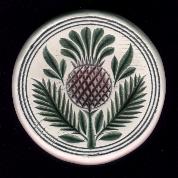
Home | Original Product Pages | About
Historic Impressions | How to contact
us | FAQ |
STORE
Butter molds were carved since at least the
17th century as a decorative and identifying way to mold butter.
Beautiful and ornate examples are abundant in the Germanic
countries, especially, where wood carving was a popular folk art.
The molds were carved originally by farmers for their own
use, sometimes including their initials and heraldic symbols, but
mainly depicting the simple pastoral world around them, farm
animals, birds and other wild creatures and flowers and fruit
both realistic and stylized. Immigrants brought their
carving arts with them and the tradition continued in this
country until the need for these molds was so great that in the
19th century, woodenware factories began producing them with
lathes and other laborsaving tools. Their original cost of
five or ten cents a piece has sky rocketed - antique butter
molds, many times without the cylindrical housing through which
the decorative stamp was pushed, sell for $300-$400 if the design
is desirable and the piece is in good shape.
Taken from a 19th century antique which depicts
the thistle, symbol of Scotland. By legend, Scottish
warriors were forewarned of Viking invaders by their screams as
they were impaled by thistles while creeping ashore at night.
4.25" x 4.25"
earthtones, blue/mauve
Taken from a 19th century English antique.
Butter stamps were used by farm women to decoratively mold
butter. The thistle has long been the symbol of Scotland.
3.75" x 3.75"
earthtones, blue/mauve
Taken from a 19th century English antique.
Butter stamps were used by farm women to decoratively mold
butter. The thistle has long been the symbol of Scotland.
3.75" x 3.75"
earthtones, blue/mauve
Taken from a 19th century English antique.
Butter stamps were used by farm women to decoratively mold
butter. The thistle has long been the symbol of Scotland.
3.75" x 3.75"
earthtones, blue/mauve
From a 19th century English butter mold, the thistle is identified
with Scotland from the legend in which the spiky plant impaled
Viking warriors trying to invade Scottish soil.
4" x 4"
multi-color
The pineapple is the symbol of
hospitality and welcome. This stems from the tradition in which
sailors, returning home with pineapples from tropical climes,
shared the large fruit with neighbors before it spoiled.
3.75" x 3.75"
earthtones
This antique butter stamp depicts a sheaf of
wheat, symbol of prosperity and wealth. This was one of the
most popular butter mold symbols as it was a good luck emblem
associated with abundant crops.
4.5" x 4.5"
earthtones
This butter stamp depicts the pomegranate,
symbol of abundance since medieval times due to the large
quantity of seeds inside the pomegranate. Such symbols
would have been good omens for abundant crops and many children.
4" x 4"
earthtones
Taken from the original antique which was used
in the 1800's by farm women to stamp butter for decoration.
It depicts the acorn, a symbol of luck.
4.25" x 4.25"
earthtones
Taken from a 19th century original antique
which would have been used by farm women to decoratively mold
their butter and identify the farm where it was made.
4.5" x 4.5"
earthtones, blue/mauve
The 19th century original antique from which this is taken was used
by farm women to decoratively mold butter. Being the origin of the
dairy product, the cow was a popular motif.
3.75" x 3.75"
earthtones, blue/mauve
Taken from an original English
antique which was used to mold butter. It depicts wheat, the
symbol of prosperity.
4.5" x 4.5"
earthtones
The sunflower, symbolizing adoration in
Victorian flower language, and later warmth and cheer, is carved
in this antique mold which was used by farms to make butter.
3.75" x 3.75"
earthtones
The scenes on the 19th century original include
a woman churning butter, a man fishing, a swan, bird and a
cottage.
6" x 3.25"
earthtones
Taken from the 19th century original antique
into which are carved vegetables, a rabbit, fish, birds and
flowers.
9" x 4.5"
walnut woodtone
Taken from a charming 19th century antique
which depicts a cherub, a coat of arms, a flower, bird and pear.
It was traditionally used to mold cookies.
7" x 3.5"
earthtones
Home | Original Product Pages | About
Historic Impressions | How to contact
us | FAQ |
STORE
Copyright © Historic Impressions.
All rights reserved.
No part of this document or of any of our work may be reproduced
in any form,
photographic, mechanical or otherwise, without written permission
from Historic Impressions.